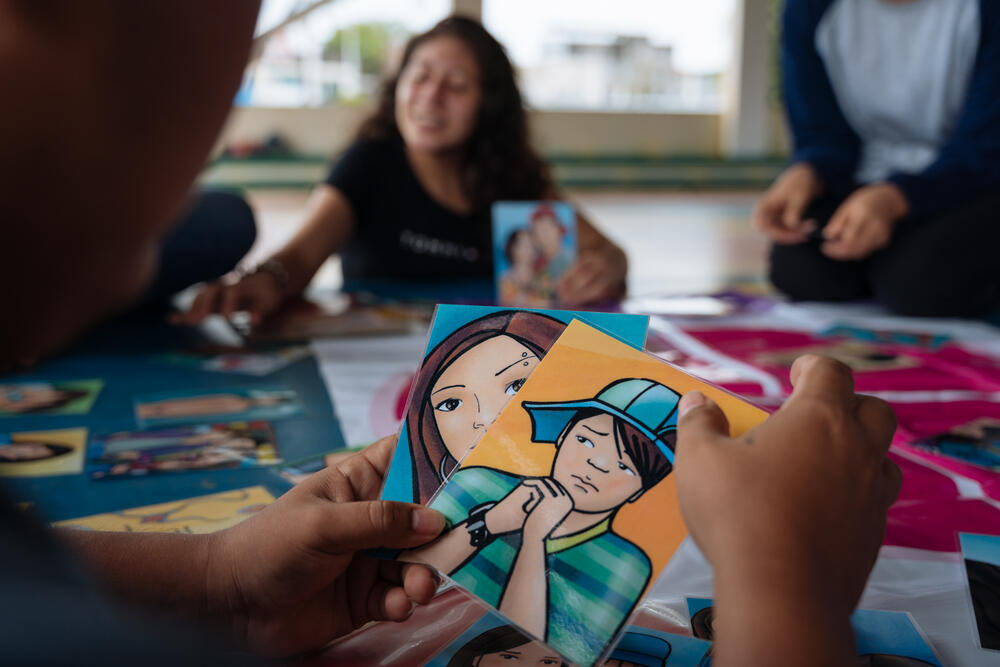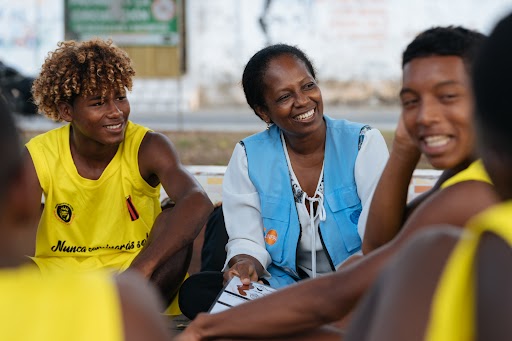News
Empowering young people in Ecuador to understand their bodies and defend their rights
- 04 September 2023
News
ESMERALDAS, Ecuador – “RuranKapak for me means freedom, knowledge, breaking myths,” said 20-year-old youth leader Janny Caicedo Corozo. “It’s about helping young people who don't know their rights and need to know them.”
Mr. Caicedo is from Limones, an island in the Pacific Ocean that is part of the coastal and border province of Esmeraldas – a region characterized by beautiful beaches and the country’s highest concentration of Afrodescendent people. He described his home as “small, but full of love”, though it is not without its challenges.
As in many societies with large Afrodescendent communities, the effects of racism and discrimination have led to gaping social, economic and health inequities. Esmeraldas is one of Ecuador’s poorest regions, and women and girls there face elevated risks of gender-based violence and adolescent pregnancy.
Mr. Caicedo wanted to change how sexuality was being discussed in his community – to alleviate fears and debunk myths. In 2018, he participated in a training session for RuranKapak, a comprehensive sexuality education programme launched in Ecuador in 2012 with the support of UNFPA, the UN sexual and reproductive health agency.

Peer-to-peer programming
RuranKapak – which translates as “I will do” or “to do it” in the Amazonian Kichwa language – is a project that gathers young people in groups for peer-to-peer, interactive information sessions supported by educators, health personnel and rights promoters on topics such as self-care and nutrition, gender-based violence, menstrual health, contraception and sexuality.
After participating in the RuranKapak session as a student, in 2018 Mr. Caicedo was invited to a UNFPA-supported training on its methodology. He has been a facilitator for the project ever since, leading many peer-to-peer information sessions over the last five years.
“The methodology has had a wonderful result,” he said. “Teenage pregnancy has decreased in my community and girls have more freedom to talk; they approach health centres to access contraceptive methods and more with their families.”
Over the last decade, nearly 1,200 adolescent and youth facilitators have been trained in RuranKapak and more than 38,000 participants have been reached with information through the sessions.
Knowing their rights
In Ecuador, as in many countries parts of the world, young people’s sexual and reproductive health and rights can be controversial to discuss, surrounded as the topic is by misinformation and stigma.
Silence on the subject, however, can put young people at risk of rights violations like gender-based violence and unintended pregnancies – both of which are a significant challenge in Ecuador. About 65 of every 100 Ecuadorian women reported having experienced gender-based violence in their lifetime in 2019, and in 2022 an average of five girls (aged 10-14) and 108 teens (aged 15-19) gave birth every day.
Although Ecuador’s maternal death rate has reduced dramatically since 2000, pregnancy and childbirth still represent a deadly risk to the country’s youths, with girls and adolescents under 19 accounting for 8 per cent of maternal deaths in 2021. This means comprehensive sexuality education can be literally life-saving.
“How to end preventable maternal deaths? Increase access to a range of quality contraceptives of the woman’s choice; invest in midwives so that every woman has access to the high-quality care she needs in pregnancy and during and after childbirth; and improve comprehensive sexuality education for young people to avoid early pregnancy – a leading cause of death among adolescent girls,” said UNFPA Executive Director Dr. Natalia Kanem.

Facing change
Adolescence is a time of change. It makes sense, then, that RuranKapak is constantly updated to ensure teens continue to connect with it.
Its implementation across several of Ecuador’s rural, border and hard-to-reach regions has had an enduring impact. For many, it has served as a gateway into human rights advocacy; some who started as facilitators when they were adolescents now work in organizations that aim to protect sexual and reproductive health and rights and combat gender-based violence.
Mr. Caicedo has many dreams and is working hard to achieve them. He is currently studying medicine at the University of Guayaquil, but hopes to return to his island and contribute to its development by creating an educational institution so that young people can help their families.
He says he will always dedicate part of his life to activism and that RuranKapak will be his greatest ally.“[RuranKapak] changes lives and addresses sexual and reproductive rights in an extraordinary way, without restrictions or discrimination,” he said.